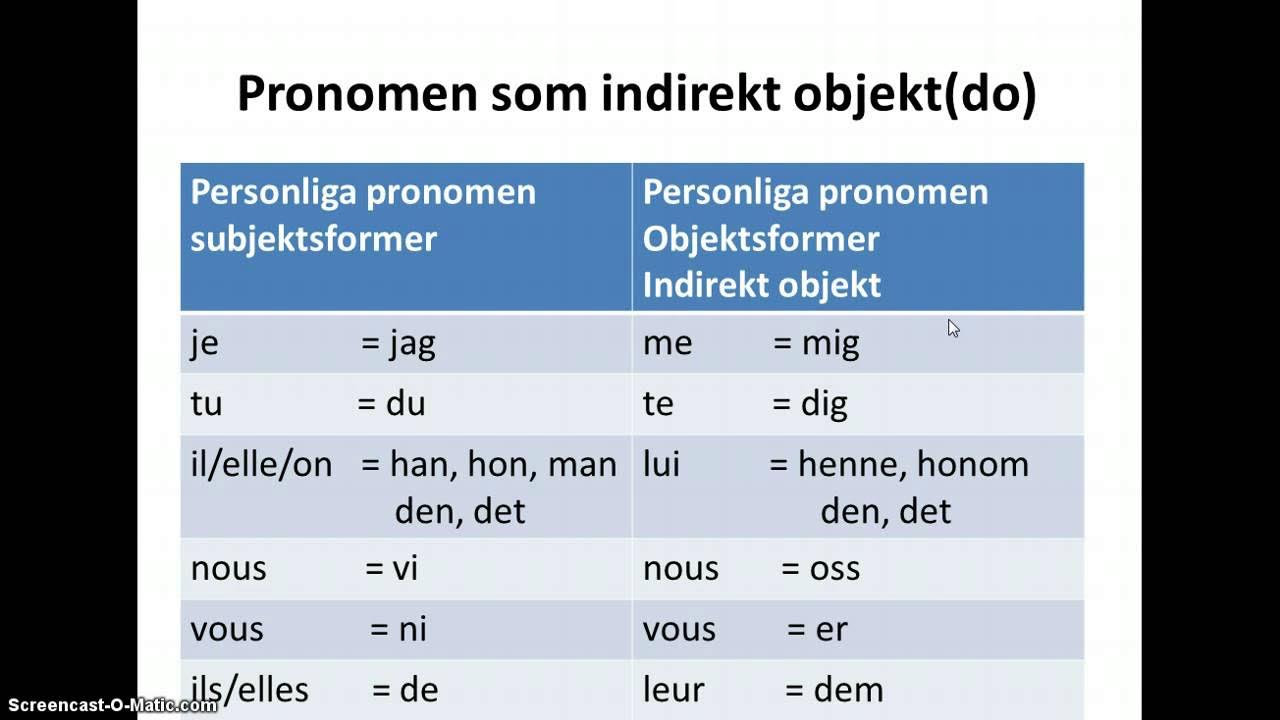Les pronoms toniques en français. Moi, toi, lui, elle... Niveau fin A1 de FLE.
Summary
TLDRThis video script focuses on the use of tonic pronouns in French, which include words like 'moi,' 'toi,' 'lui,' and 'elle.' These pronouns are used for emphasis, making distinctions between subjects, and following prepositions. Examples are provided in context, such as comparisons ('je suis plus grande que lui') and interactions ('toi, je m'appelle Tony, et toi?'). The script also includes practical sentences for learners, helping to illustrate both personal and reflexive pronouns in everyday communication, such as discussing preferences and activities ('tu veux venir avec nous?').
Takeaways
- 😀 Pronoms toniques (emphatic pronouns) are used to emphasize or differentiate people (e.g., moi, toi, lui, elle, nous, vous).
- 😀 Example sentence: 'Moi, je suis française et vous, nous nous sommes italiens.' This shows how pronouns are used for emphasis in comparison.
- 😀 These pronouns are often used after prepositions to clarify the subject, such as 'avec' (with).
- 😀 For example, 'Tu veux venir avec nous?' (Do you want to come with us?).
- 😀 Pronouns can also be used in response to questions, such as 'C'est vous madame Durand?' (Is it you, Madam Durand?).
- 😀 The pronoun 'c'est pour moi' (it's for me) and its variant 'c'est pour vous' (it's for you) are commonly used to specify possession or direction.
- 😀 The phrases 'toi, moi' (you, me) are used to contrast or compare actions between two people, as seen in 'toi, je m'appelle Tony et toi?' (you, I’m Tony, and you?).
- 😀 In conversations, simple exchanges like 'Ça va bien et toi?' (I’m good, and you?) use pronouns for informal communication.
- 😀 Comparisons like 'je suis plus grande que lui' (I am taller than him) demonstrate how pronouns are used to express differences between people.
- 😀 The dialogue highlights informal French usage, such as 'Je préfère rentrer chez moi' (I prefer to go back home), which emphasizes personal choice.
Q & A
What are tonic pronouns in French?
-Tonic pronouns in French are pronouns used to emphasize or distinguish a person. They are: moi (me), toi (you), lui (him), elle (her), nous (us), vous (you - formal/plural), and eux (them).
When are tonic pronouns used for emphasis?
-Tonic pronouns are used for emphasis when a speaker wants to stress or highlight the subject of a sentence, such as in 'Moi, je suis française' (As for me, I am French).
How are tonic pronouns used to mark a difference?
-Tonic pronouns can mark a difference by contrasting the speaker with others, for example, 'Moi, je suis française et vous, vous êtes italien' (As for me, I am French, and you, you are Italian).
Can tonic pronouns be used after prepositions?
-Yes, tonic pronouns are used after prepositions. For instance, 'avec moi' (with me), 'chez toi' (at your place), and 'pour elle' (for her).
What is an example sentence where a tonic pronoun is used after a preposition?
-An example sentence is 'Tu veux venir avec nous ?' (Do you want to come with us?).
How do tonic pronouns function in informal conversation?
-In informal conversation, tonic pronouns are often used to express contrast, informality, or even to ask questions. For example, 'Moi, je m'appelle Tony et toi ?' (I am Tony, and you?).
How do tonic pronouns compare when used in a question?
-In questions, tonic pronouns can help clarify the subject. For example, 'Qui va chercher les cafés ? Toi ou moi ?' (Who will get the coffees? You or me?).
What is an example where tonic pronouns are used for comparison?
-A comparison using tonic pronouns can be seen in 'Je suis plus grande que lui' (I am taller than him).
What is the role of the tonic pronoun in 'C'est pour moi'?
-In 'C'est pour moi' (It's for me), the tonic pronoun 'moi' emphasizes the recipient of the action, indicating that something is specifically for the speaker.
Why is the tonic pronoun 'vous' used in the sentence 'C'est pour vous'?
-'Vous' is the formal or plural form of 'you' in French. In 'C'est pour vous' (It's for you), 'vous' emphasizes the person being addressed, which could be one person formally or multiple people.
Outlines

This section is available to paid users only. Please upgrade to access this part.
Upgrade NowMindmap

This section is available to paid users only. Please upgrade to access this part.
Upgrade NowKeywords

This section is available to paid users only. Please upgrade to access this part.
Upgrade NowHighlights

This section is available to paid users only. Please upgrade to access this part.
Upgrade NowTranscripts

This section is available to paid users only. Please upgrade to access this part.
Upgrade NowBrowse More Related Video

French Pronouns

PRONOMES INTERROGATIVOS "WHAT - WHICH - WHERE - WHEN - WHY - WHO - HOW" EM INGLÊS

Materi Bahasa Arab Kelas 7 MTs Semester 1, Bab 1 التعارف perkenalan, kegiatan 1, Tarkib

Genomgång av indirekt objekt i franska

TOUTE la Grammaire dont vous avez besoin pour le français AVANCÉ (Niveau C1)

60 Important Rules Of Grammar || Rule - 1 || Basic English Grammar in Hindi || English With Rani Mam
5.0 / 5 (0 votes)